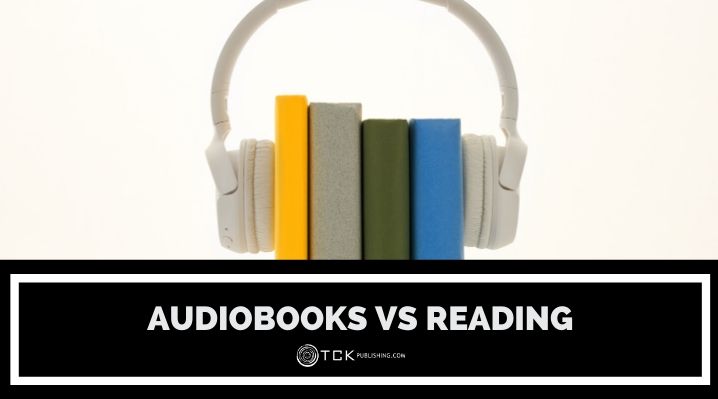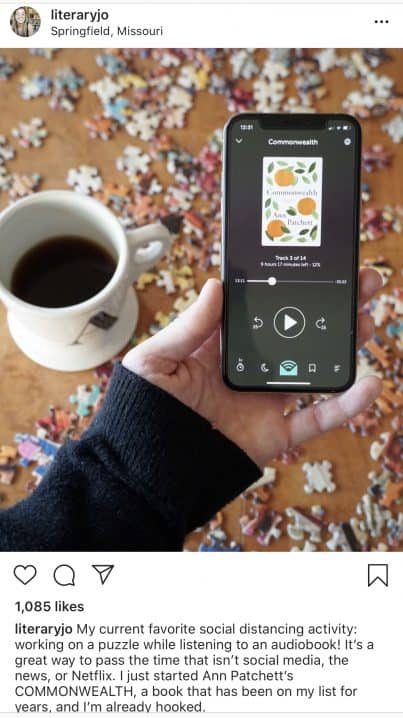
Several years ago, the hottest debate among book lovers was whether reading ebooks was as beneficial (or enjoyable) as a crisp paperback or hardcover.
Now, that discussion has evolved to include audiobooks. But here the conversation gets interesting: whereas both ebooks and print books involve actual reading, audiobooks only require us to lend our ears in order to enjoy them. And that’s not really the same as reading… right?
As it turns out, listening to audiobooks also comes with quite a few benefits and might be just as effective as regular books when it comes to learning.
Audiobooks vs. Reading
Let’s take a look at several important factors to see how well listening to audiobooks stacks up against good old-fashioned reading.
Comprehension

When it comes to comprehension, a lot of what you’re able to absorb depends on your preferred learning style. Some people absorb more when they read or see information, while others learn better if they listen to someone explain a concept or narrate a story.
For some, reading words on a page might help them to focus better and absorb the scenes in their own way (like imagining the unique voices for each character). But with audiobooks, if the author contributes to the narration, you’ll likely get the experience they intended readers to have, since they’ll be in control of the cadence and tone with which the book is read.
However, we should also consider the fact that many people listen to audiobooks while multitasking. Playing a book while you’re driving, cleaning, cooking, or doing other things might lead to increased distractions, which means listeners might miss some details or subtleties that can actually make quite a difference in how they experience the book.
Overall, it can be said that your comprehension depends more on your ideal learning style and how many distractions you have, than it does whether you’re reading or listening to the words.
Connection
Whether you’re reading a physical book or listening to an audiobook, you’ll (hopefully) have some sort of emotional connection to the material.
The difference between reading and listening can best be categorized as a personal vs. social experience.
Reading often provides a more personal experience, as your own mind will be in charge of assigning voices to the characters and creating all the mannerisms and subtleties that comes with a unique human voice.
Personally, this is why I prefer reading books—and listening to an audio version afterward is kind of like seeing a movie after reading the book it was based on: if the actors don’t match up with the way I portrayed the characters in my head, the whole thing just feels kind of off. Not necessarily bad, but definitely something different.
Listening to audiobooks, on the other hand, can create a more social experience, yet still intimate, as you’ll hear a human voice talking directly into your ear, as if they were speaking to you and no one else.
Multitasking
Of course, when it comes to multitasking, the winner here is clear: audiobooks allow you to work on other tasks while listening to the book, as you would the radio.
Just imagine trying to cook, clean, or drive while holding a paperback in your hand!
However, what you gain in your ability to multitask with audiobooks you might lose in comprehension. As you’re doing chores or concentrating on switching lanes, you might miss some key details, or just have a less engaging experience than you would with a physical book.
Still, you can always hit the Rewind button and pick up what you missed, just as you can always flip back a few pages to reread a passage.
Memory
One of the proven benefits of reading is that it helps to build a stronger memory. But does it matter if you read the words on a page or listen to them?
In a 2016 study, one group of readers was asked to listen an excerpt from the audiobook version of Laura Hillenbrand’s Unbroken, while another group read the same excerpt on an e-reader. A third group read and listened at the same time.
All participants were then given a quiz to measure how well they had absorbed the material. It was concluded that participants were able to recall as much from reading as they were from listening.
Sharing
If you don’t post an artfully-construed scene featuring your latest read on your Bookstagram, did you even read the book?
Book lovers love sharing their finds on social media, from personal recommendations to their favorite quotes. So which platform makes for the most Insta- or Facebook-worthy content?
At first glance, it seems like hard copies and e-readers might lend themselves best to your book-themed photoshoots. And they certainly do seem to be the favorite of many bookish influencers.
But don’t count out the audiobook just yet! As you can see from the example below, you can still find creative ways to snap a pic with your audiobooks, or simply upload a screenshot of whatever you’re listening to at the moment.

Some services, such as Audible, also allow you to share short audio clips, making audiobooks just as shareable as their print and ebook counterparts!
Are Audiobooks as Good for Your Brain as Reading?
Reading has been proven to provide a number of benefits to your brain, and make you smarter overall. However, science also tells us that listening to audiobooks can also have very positive effects on the brain.
For example, according to a study by the Journal of Verbal Learning and Verbal Behavior, our brains are more likely to create meaningful imagery when we listen to stories, as opposed to reading them in traditional format. That’s because when we listen instead of read, our brains are allowed more space for their visual processes to do their thing.
In addition, audiobooks can also help boost your comprehension and vocabulary as much as their print and digital counterparts.
Audio versions might even have an extra advantage for those of us learning English as a second language or teaching kids to read, since proper pronunciation will be guaranteed.
This benefit can be enhanced by following along with the text while listening to the audio.
Find Books You’ll Love
There’s no question that both reading and listening to books come with some big perks for your brain and overall well-being.
Thankfully, a great read (or listen) is more accessible than you’d think! There are dozens of free and cheap print books, audiobooks, and ebooks out there waiting to be discovered! You can also sign up for our free book deals newsletter and get info on the latest deals delivered straight to your inbox.
Do you prefer reading or listening to books? Tell us why in the comments below!
If you enjoyed this post, then you might also like:
- The Best Deals on Books: 17 Sites That Offer Free and Low Priced eBooks, Print Books, and Audiobooks
- 10 of the Best Websites to Download Free Audiobooks
- 9 Amazing Benefits of Reading
- How to Read More Books: 16 Tips to Help You Reach Your Reading Goals
As a blog writer for TCK Publishing, Kaelyn loves crafting fun and helpful content for writers, readers, and creative minds alike. She has a degree in International Affairs with a minor in Italian Studies, but her true passion has always been writing. Working remotely allows her to do even more of the things she loves, like traveling, cooking, and spending time with her family.

I regularly listen to podcasts at work as I work as a housekeeper, so my job is literally mindless cleaning all day long. I’ve run out of podcasts and picked up audiobooks. I miss reading a paper book, but by the end of the day, I’m so tired I can’t even fathom sitting down and reading a book anymore. All in all, audiobooks have become my new favorite format. I can enjoy all the books I want all day long, and if I really enjoy them, I’ll order a paper copy.
Child is 15 is a smart student he prefers to listen to a story than holding the book and reading. I feel that at this age reading the book is better. He’s still learning. Now as a grown adult who has read a lot in one’s life audio is good!!
Listening is fine, but I actually think that reading from traditional print is the best way to really understand. The tactile experience of the page is different from the short-term experience associated with reading from a screen. Listening may be on the level of an e-reader, but I just don’t think it can compare to the traditional ink and paper experience.
Hi David, thanks for sharing your thoughts! I personally agree with you — I listen or read e-versions of some things for convenience, but if it’s something I really care about and want to enjoy the whole experience, I definitely prefer turning the pages of a print book!
I like both, but for entertainment books audio is more convenient. However, if I wish to learn something then I prefer e-book because its easier to take notes and you are not so distracted, as you are not multitasking. I simply highlight the interesting text and use the e-book feature to revisit the notes, even make flashcards.
I find that if an audible variant of a non-fiction book is interesting I will then consider getting the e-book version to aid in study.
thanks for sharing your view, Ross! I agree, audiobooks are great for multitasking, but ebooks are better for me if I want to focus on the info